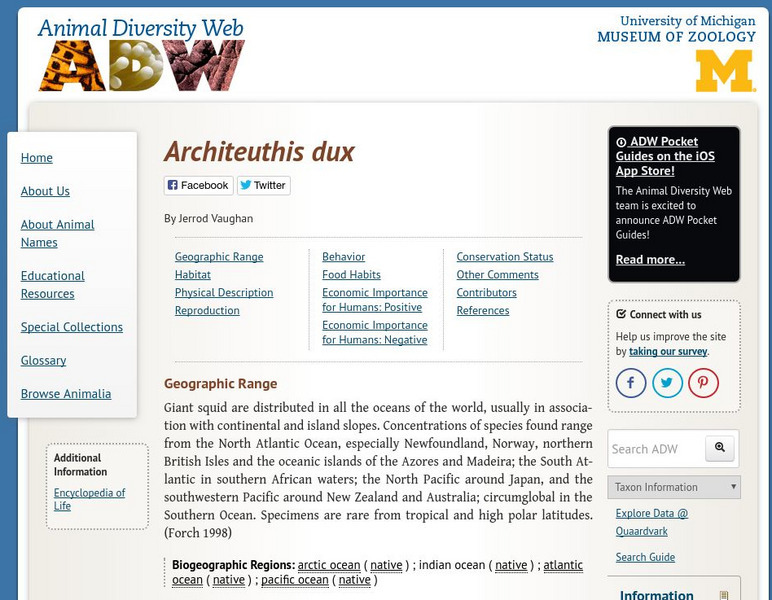Hi, what do you want to do?
Curated OER
I Am A Penguin
Students select one of the penguins from the Penguin page and collect enough information to give a good description of the penguin. They should write a descriptive piece without actually identifying the penguin until the last sentence.
Curated OER
Creatures That Glow In The Night
Students investigate the different bioluminescent organisms. They use microscopes in order to make observations and draw what is seen. Students demonstrate they have studies the differences between the process of photosynthesis and...
Curated OER
Light My Fire ...Fly
Students examine fire flies. They measure the frequency of light stimulus used by communicating fire flies. Students explore the concept of organisms using light to communicate. Students film the fire flies and quantify the duration...
Curated OER
Zebra, Zebra Where Are Your Stripes?
Students observe the embryological development in the zebrafish. Developmental hierarchy from three germ layers is studied in depth. Research is validated on the body plan of the embryo.
Curated OER
Soar to Salt Lake City
Young scholars improve their cardio-respiratory fitness and to learn about our country. They move (skip, jog, walk, slide, gallop, etc.) for 2 minutes (approximately .2 mile). Fourth graders calculate our weekly mileage and are...
Curated OER
Who Eats Whom in a Bermudian Coral Reef?
Students will be able to find out about feeding relationships on a coral reef. They then will be able to develop a food chain and food web using coral reef animals and plants using the Coral Website.
Curated OER
The Bottlenose Dolphin: Reading Comprehension
In this comprehension worksheet, learners read a selection about the Bottlenose Dolphin, then answer 5 multiple choice questions. Answers provided.
Curated OER
Subject-Verb Agreement
In this subject and verb agreement worksheet, learners read the sentences and find the errors in subject and verb agreement. Students draw a line through the errors and write the corrections in the provided space.
Curated OER
Word Choice: Whose and Who's
In these word choice worksheets, students read the sentences and select the correct option to complete the sentence from the words whose or who's.
Curated OER
Critter Characteristics
Students explore the adaptations of deep sea life forms. In this science lesson plan, students watch a video to observe characteristics which allow for the sea creature to thrive in it's environment. Students determine the...
Curated OER
Nudibranchs-Splendid Sea Slugs
Pupils brainstorm a list of colorful animals and research why they are colorful. In this biology lesson, students sketch what a nudibranchs look like before watching a video. They compare their sketch to the actual...
Curated OER
Whales
Students compare and contrast the two types of whales. In this biology lesson, students research the characteristics of their assigned whale. They compile their findings in a folder.
Curated OER
A Fish by Any Other Name-Language Activity
In this language learning exercise, students try to match the names of 13 sea creatures with their names in languages other than English. Answers appear at the bottom of the page.
Other
National Aquarium in Baltimore: Squid Lab [Pdf]
This handbook is intended to be used before and after an aquarium visit but can be used on its own. It has information about cephalopods, with a focus on the squid. Learners learn about squid anatomy and physiology, survival adaptations,...
Smithsonian Institution
National Museum of Natural History: Ocean Planet: In Search of Giant Squid
An on-line exhibit archived from a Smithsonian exhibit explores and interprets the facts and myths surrounding giant squids - the world's largest invertebrates.
Chase Young, PhD
Dr. Chase Young, Ph D: Reader's Theater Script: The Squid and the Stickbug [Pdf]
Originally published in The Reading Teacher, two second graders authored this reader's theater script titled "The Squid and the Stickbug" while in Dr. Chase Young's class. Three roles are needed in this activity.
Enchanted Learning
Enchanted Learning: The Squid
Discover more about the squid when you explore this resource. This site includes a diagram of this soft-bodied cephalopod and information on its diet, anatomy, predators and more.
A-Z Animals
A Z Animals: Animal Facts: Squid (Teuthida )
This entry identifies the defining characteristics of the teuthida, more commonly known as the squid.
American Museum of Natural History
American Museum of Natural History: Giant Squid O Logy Card
Flip over this interactive OLogy card and start learning bite-size pieces of useful information about the giant squid, including details regarding its 2006 discovery.
Enchanted Learning
Enchanted Learning: Giant Squid
What makes a giant squid unique? This site features a diagram and some information about this cephalopod. Students can learn about the giant squid's anatomy, diet and more through this resource.
Regents of the University of Michigan
Animal Diversity Web: Giant Squid
The Animal Diversity Web provides a detailed overview of the giant squid. Content includes a focus on the giant squid's geographic range, habitat, physical description, reproduction, behavior, food habits, and more.
Other
Museum of New Zealand Te Papa Tongarewa: Colossal Squid: Top (Dorsal) View [Pdf]
A printable, one-page dorsal view of the external squid anatomy. This particular diagram features the colossal squid, believed to be the largest squid species.
Sheppard Software
Sheppard Software: Squid
This site gives an in-depth description of a squid, including its behavior, appearance, and classification. The site includes photos and illustrations and an interactive quiz to test your understanding.
University of California
The Color Changing Squid
Try to solve the mystery of the color changing squid in this interesting and interactive site.
Other popular searches
- Dissecting a Squid
- Giant Squid
- Vampire Squid
- Squid Dissection
- Photograph of Giant Squid
- Giant Squid Facts
- Squids Will Be Squids
- Colossal Squid Food Chain
- Colossal Squid
- Squid Dichotomous Key
- Squid Experiments
- Dissecting a Squid Diagram


















![National Aquarium in Baltimore: Squid Lab [Pdf] Lesson Plan National Aquarium in Baltimore: Squid Lab [Pdf] Lesson Plan](https://static.lp.lexp.cloud/images/attachment_defaults/resource/large/FPO-knovation.png)







